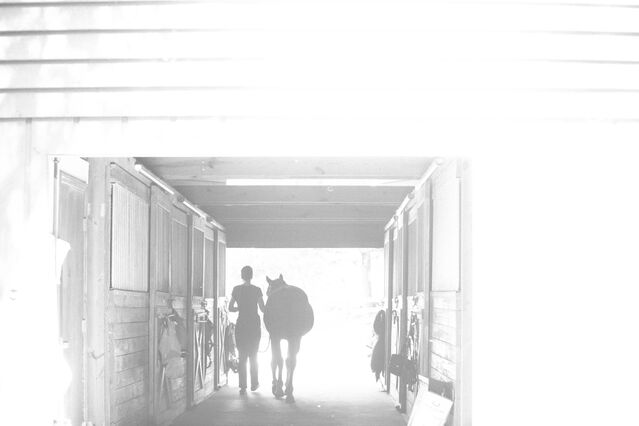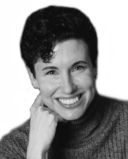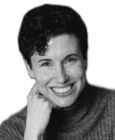Relationships
Lessons from Love...and Loss...of Lee
Uncertainty can be the foundation of fear, but it is also the bedrock of hope.
Posted July 23, 2020 Reviewed by Kaja Perina
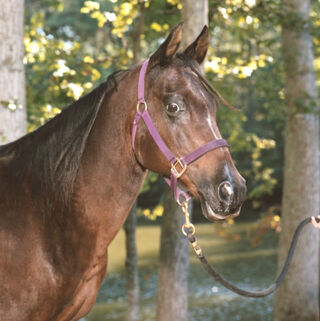
On July 14, 2020, I lost my soulmate. My 35-year-old Arabian horse, Speciale Lee, died in the ICU of the University of Georgia Veterinary Teaching Hospital, with me by his side. Even though he was close to 100 years old in human years, Lee still acted like a yearling (as you can see in this video) right up until the last weeks of his life: running around bucking and kicking up his heels, whinnying his joy at being alive.
His death is an enormous loss, as we’d been together for more than 16 years. As I’ve worked to process my grief, I’ve been thinking about all Lee taught me and is continuing to teach me even though he’s gone. Knowing I’m not alone in going through grief right now, as we’re all experiencing loss and grief due to the pandemic, I thought I would share lessons from my love and loss of Lee in hopes that they will bring you as much comfort and hope as they have given me.
Know you are good enough
Even though I grew up with ponies and Lee was with me for more than half my adult life, I never considered myself to be very good with horses. I’d compare myself to others at various barns, thinking nervously, “They look like they know what they’re doing. But I don’t. I’m probably doing this [whatever it was] wrong.”
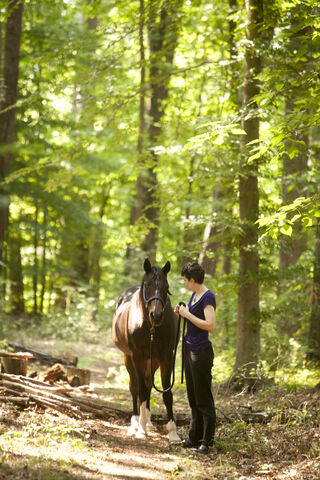
It’s true that I had things to learn, especially in recent years as Lee battled colic and laminitis (both of which he beat) and developed Equine Cushing’s Disease (also called PPID). But no matter how much I learned, in the back of my mind, there was always this demeaning voice shaming me, telling me that I still wasn’t “good enough." It wasn’t until I received a sympathy card with the following words from my vets, Drs. Rose and Mike, that I recognized that maybe over the course of Lee’s life I had been selling myself short:
"I do not believe that we have managed a horse with PPID for quite as long as we tended Lee and that was down to you. Your dedication, love and excellent nursing care made such a difference in Lee’s success story. Of course the other key was Lee’s mighty will—he was simply not going to be “corralled” by a disease. Lee put the Energizer Bunny to shame!"
I can’t tell you how many times I’ve read those words, just to take in my vets’ perspective and the unfamiliar sense that I was good enough, that I was doing a good job, even an excellent job, as part of Team Lee. I was a good enough rider and trainer and companion and partner and mom to my horse. I wasn’t perfect, I made mistakes, and there’s always still more to learn, but I was good enough.
So many of us, especially those of us who have OCD, walk around thinking that we’re not enough. This feeling can become intensified in the face of the pandemic because we’re juggling multiple, simultaneous demands: working, parenting, and managing the new "normal" of everyday life while facing tremendous uncertainty about the best ways to move forward.
There is, therefore, no better time than now to take to heart this lesson I learned from Lee’s life and loss. No matter what that voice in your head tells you about not measuring up, it’s wrong: You are enough. Counter that naysaying voice every day by taking the time to recognize your positive qualities and what you’re doing right. You may not have or be all you want, but just as you are, you are enough.
Recognize that uncertainty is the bedrock of hope
The day before Lee died, when he was in the ICU at UGA, I was driving back from his boarding barn where some friends and I had gathered, waiting to hear whether the hospital, which wasn’t allowing any visitors due to COVID-19, was going to allow me to see Lee.
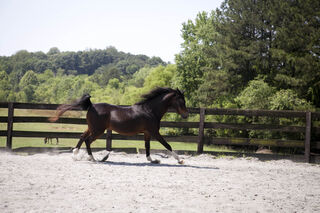
I had received news that morning that Lee had a severe case of pneumonia. While he could beat the pneumonia with a months-long course of antibiotics, which I was willing and even enthusiastic to do, his university vet said that he likely had other underlying conditions that he might not be able to overcome, such as cancer. She said he had less than a 50% chance of surviving. She also told me that he was sick enough that he could die at any moment.
As I drove from the farm down an unfamiliar road suggested by a friend as a shortcut to my house, I realized I’d forgotten to stop by the grocery store for a few supplies. I drove to the end of the street and turned around. Houses flickering by under the dappled sunlight as I headed back toward the store, I thought about Lee’s prognosis.
According to my OCD, if there’s a 0.0001% chance that something bad could happen, it’s going to happen. So why can’t I turn that strange logic around and use it to my advantage for once? I could call a less than 50% chance of survival a 48% chance, for instance. By my OCD’s logic, that’s 480,000 times more likely to happen than the .0001% it always thinks is definitely going to happen, so that’s an enormous chance of success! Great odds, by my OCD’s math, that I’m not going to lose my soulmate. Therefore, I should have hope.
And I kid you not, when I looked up at the street sign I was passing as I had that thought, it said Hope Street.
I took that as a sign from the universe to hold onto hope that my beloved horse would survive. There was so much uncertainty—what was causing the pneumonia, how extensive his issues were, whether his body at age 100 could fight back—but that uncertainty was in my favor. I didn’t know what was going to happen, but Lee’s “mighty will" could prevail.
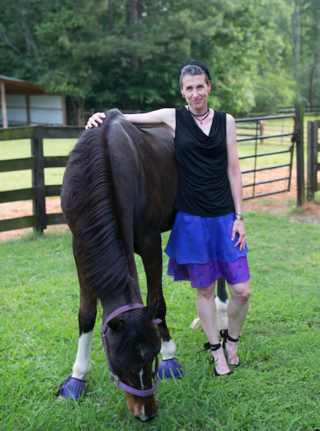
I’m intimately familiar with uncertainty because OCD is based on an intolerance of uncertainty. Uncertainty is the basis of the fear that people with untreated OCD face on a daily basis. It’s also the basis of the fear we can all feel at some level due to the pandemic. We don’t know what’s going to happen, and the future could be bad.
But it also could be good, because uncertainty is not all bad. I didn’t know what was going to happen to Lee, but there was a chance he would live, and that chance, that uncertainty, was the bedrock of my hope.
I held on to that hope until the moment the vet told me his body was starting to fail and that he wouldn’t be able to recover. The hope I had before he died is precious to me because it allowed me to function, to make decisions, to take care of my other pets, to envision a future where we were together. Hope pulled me through, and even though things did not go how Lee nor I wanted them to, I still have hope. Hope that someday my world won’t feel so upside down, that the sorrow will subside, that my memories of all the wonderfully wild rides that Lee and I shared will bring me nothing but joy.
We all need hope right now. So when you look forward into the future—where vaccines and COVID treatments and the economy and our very way of life are all up for grabs—remember that there are two sides to uncertainty, and on the flip side of fear lies the bedrock of hope.
Believe in yourself: Shoulders back!
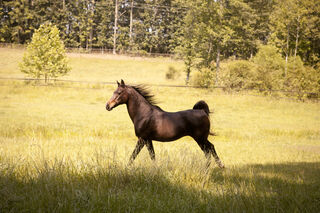
Being an Arabian, Lee had a fiery spirit. As I’d ride him in the Kennesaw Mountain National Battlefield Park over the past 10 years, he’d use any excuse … or none at all … to take off at a gallop. While exhilarating, his bursts of speed were also a bit scary because Lee was fast. Really fast.
For years, when Lee would demonstrate his Kentucky Derby-worthy qualities, I would tense up, crouching in a defensive posture over his withers and neck while tugging on the reins with all my might, trying to get him to slow down. But no matter how hard I pulled or how many times I said “Whoa!” Lee would just go faster, the drumbeat of his hooves a fast staccato as we flew at dizzying speeds over the winding forest trails.
It took me almost a decade to cotton on to what Lee had been trying to communicate by speeding up instead of slowing down:
Lee had been running away with me because of my posture—because I’d acted like prey! I’d sit on Lee, anxious and tense, hunched over and small, telegraphing through my stance that I was scared. Horses are prey animals. Their main defense is running. If one of the herd acts scared, they all run. It’s their best chance of staying alive. I was Lee’s herd when we were riding, and I was acting like something was about to kill us every time I tensed up and leaned forward...
“Shoulders Back,” I said out loud, patting Lee gratefully on the neck. I’d finally learned the simple yet powerful strategy that my horse had been trying to teach me for almost a decade.
(From my book, Is Fred in the Refrigerator? Taming OCD and Reclaiming My Life, pp 222-223.)
Shoulders back became my main and most successful exposure and response prevention (ERP) strategy for battling my untreated OCD: I’d adopt a confident posture, even though I’d feel quite scared, and do what I wanted and needed to do throughout my day without avoiding OCD triggers and without doing compulsions. Day by day, my world expanded, and over time, every "shoulders back" victory, big or small, added up to the eventual gift of a reclaimed life.
The challenges we are currently facing are unprecedented and daunting enough to make us cower in fear. But that’s no way to live life. So I continue to not only put my mask on, but to put my shoulders back in memory of a magnificent horse who taught me how to believe in myself: that I can do hard things, successfully battle my demons, and learn how to accept and even enjoy life, even when things don’t go as planned.
And you can, too.
For notifications of new blog posts as well as OCD-taming tips & resources, sign up for my Shoulders Back! newsletter.
